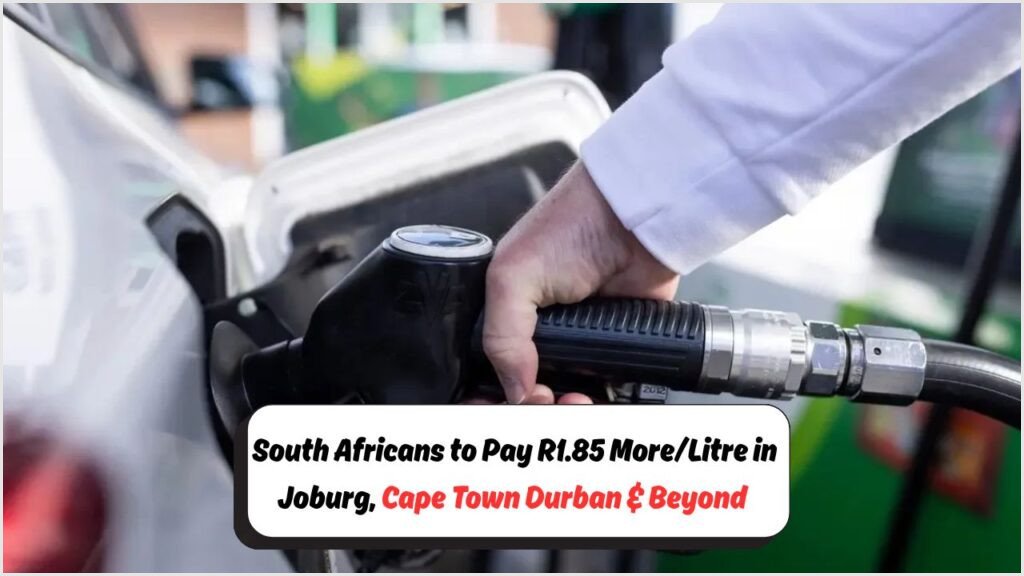Petrol Price Increase in South Africa: As South Africans brace for the upcoming petrol price hike, it’s essential to understand the broader impact on daily life and the economy. The petrol price is set to increase by R1.85 per litre, effective August 7. This change comes amidst global oil price fluctuations and local economic pressures, prompting citizens to consider the timing of their fuel purchases. With transportation costs on the rise, the ripple effect will likely be felt across various sectors, from consumer goods to public services.
Understanding the Impending Petrol Price Surge
The announcement of a R1.85 increase per litre in petrol prices has left many South Africans concerned about the immediate impact on their budgets. This increase is attributed to several factors, including the depreciation of the Rand and rising global oil prices. As a result, consumers are advised to fill up their tanks before the price hike takes effect. The increase will not only affect individual motorists but also have broader economic implications, affecting the cost of goods and services nationwide.
 Discover the Fastest Way to Unlock NSFAS Funds: Thousands Swear by This Proven Appeal Format!
Discover the Fastest Way to Unlock NSFAS Funds: Thousands Swear by This Proven Appeal Format!
- Global oil price fluctuations
- Impact of Rand depreciation
- Economic consequences
Table: Petrol Prices Over the Last Year
| Month | Price per Litre (R) | Change (R) | Percentage Increase | Cumulative Increase (R) |
|---|---|---|---|---|
| January | 16.85 | – | – | – |
| February | 17.20 | 0.35 | 2.08% | 0.35 |
| March | 17.80 | 0.60 | 3.49% | 0.95 |
| April | 18.15 | 0.35 | 1.97% | 1.30 |
| May | 18.50 | 0.35 | 1.93% | 1.65 |
| June | 19.00 | 0.50 | 2.70% | 2.15 |
| July | 19.50 | 0.50 | 2.63% | 2.65 |
| August | 21.35 | 1.85 | 9.49% | 4.50 |
Impact of Fuel Hikes on South African Economy
The repercussions of the petrol price increase extend beyond the forecourt. Higher fuel costs translate into increased transportation and production expenses, affecting the price of goods and services across the board. This can lead to inflationary pressures, reducing the purchasing power of consumers. Businesses reliant on logistics may face tighter margins, potentially leading to job cuts or price hikes for consumers. The agricultural sector, which depends heavily on fuel for machinery and transport, may also experience elevated costs, affecting food prices.
 August 17, 2025: R1,250 Foster Child Grant Payout Begins – Ensure You Receive Your SMS Alert!
August 17, 2025: R1,250 Foster Child Grant Payout Begins – Ensure You Receive Your SMS Alert!
Strategies to Mitigate Fuel Price Impact
- Carpooling: Share rides with colleagues or friends to reduce individual fuel consumption.
- Public Transport: Increased use of buses and trains can significantly cut down on personal fuel expenses.
- Fuel-efficient Vehicles: Consider investing in vehicles that consume less fuel or are hybrid in nature.
- Telecommuting: Work from home arrangements can decrease the necessity for daily commutes.
- Regular Vehicle Maintenance: Ensure your vehicle is in good condition to optimize fuel efficiency.
Preparing for the Fuel Price Increase Before August 7
With the imminent rise in petrol prices, South Africans are advised to strategize their fuel purchases. Filling up before August 7 can provide immediate savings. Additionally, planning travel routes to minimize fuel consumption can be beneficial. Consumers should also be aware of potential long-term strategies, such as investing in more fuel-efficient vehicles or exploring alternative modes of transportation, to cope with future price changes.
Tips for Fuel Saving
- Plan Your Trips: Combine errands into a single trip to save fuel.
- Drive Smoothly: Avoid rapid acceleration and braking to improve fuel efficiency.
- Check Tire Pressure: Ensure tires are properly inflated to reduce fuel consumption.
- Avoid Idling: Turn off the engine when stationary for long periods.
- Use Air Conditioning Wisely: Excessive use can increase fuel use.
- Reduce Weight: Remove unnecessary items from your vehicle to improve fuel economy.
- Monitor Fuel Prices: Keep an eye on local fuel prices to take advantage of lower rates.
Government’s Role in Fuel Price Regulation
The South African government plays a crucial role in regulating fuel prices through various levies and taxes. These include the Road Accident Fund levy and the general fuel levy, which contribute to the overall petrol price. While these are necessary for maintaining infrastructure and supporting road accident victims, they also add to the consumer’s burden. Government interventions, such as subsidies or tax adjustments, could potentially ease the impact on consumers. However, balancing fiscal needs with public welfare remains a complex challenge.
Table: Components of Petrol Price in South Africa
| Component | Description | Percentage of Total Price | Impact on Consumers | Potential Adjustments |
|---|---|---|---|---|
| Basic Fuel Price | Cost of fuel before taxes and levies | 50% | Direct cost from global oil prices | Minimal |
| Fuel Levy | Government tax for infrastructure | 20% | Increases overall price | Adjustable |
| Road Accident Fund Levy | Funding for road accident victims | 15% | Necessary for public safety | Adjustable |
| Wholesale Margin | Profit margin for fuel wholesalers | 10% | Impacts pricing strategies | Regulated |
Consumer Reactions to Fuel Price Changes
With the news of the impending fuel price increase, South African consumers have expressed a mix of concern and frustration. Many are considering alternative commuting options and budgeting strategies to manage their expenses. The increase has sparked conversations about the need for sustainable energy solutions and improved public transport infrastructure to mitigate future price fluctuations. As consumers adapt to these changes, there is a growing call for government action to address the underlying factors contributing to these frequent hikes.
Ways South Africans Are Coping with Fuel Hikes
- Adopting Budgeting Techniques: Many households are revisiting their budgets to allocate more for fuel.
- Exploring Alternative Fuels: Some are looking into LPG and other alternatives.
- Investing in Public Transport: Increased reliance on buses, trains, and shared taxis is noticeable.
- Enhancing Fuel Efficiency: Drivers are adopting better driving habits to conserve fuel.
- Utilizing Technology: Apps that track fuel prices and consumption are becoming popular.
- Switching to Carpooling: Shared rides are becoming more common to spread fuel costs.
- Remote Work Options: Companies are offering more flexible work-from-home arrangements.
- Community Initiatives: Neighbourhood carpools and community transport groups are forming.
Understanding the Broader Implications
The petrol price increase scheduled for August 7 is a significant event that highlights the interconnected nature of global oil markets and local economic policies. Consumers are encouraged to take proactive steps to manage their fuel expenses and consider the environmental impact of their transportation choices. As South Africa navigates these challenges, the focus may shift towards more sustainable energy practices and policies that align with global efforts to reduce carbon footprints and enhance energy independence.
FAQs: Navigating the Petrol Price Hike
How can I save on petrol costs?
Consider carpooling, using public transport, and maintaining your vehicle for optimal fuel efficiency.
What causes petrol prices to increase?
Factors include global oil prices, currency fluctuations, and government levies.
Will the government provide relief for the price increase?
While there may be discussions, changes in levies or subsidies are not guaranteed.
How does the petrol price affect inflation?
Higher fuel costs can lead to increased prices for goods and services, contributing to inflation.
Are there alternative fuels available in South Africa?
Yes, options like LPG and electric vehicles are available, though adoption is still growing.




